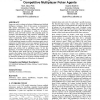Free Online Productivity Tools
i2Speak
i2Symbol
i2OCR
iTex2Img
iWeb2Print
iWeb2Shot
i2Type
iPdf2Split
iPdf2Merge
i2Bopomofo
i2Arabic
i2Style
i2Image
i2PDF
iLatex2Rtf
Sci2ools
ATAL
2010
Springer
2010
Springer
Using counterfactual regret minimization to create competitive multiplayer poker agents
Games are used to evaluate and advance Multiagent and Artificial Intelligence techniques. Most of these games are deterministic with perfect information (e.g. Chess and Checkers). A deterministic game has no chance element and in a perfect information game, all information is visible to all players. However, many real-world scenarios with competing agents are stochastic (non-deterministic) with imperfect information. For two-player zero-sum perfect recall games, a recent technique called Counterfactual Regret Minimization (CFR) computes strategies that are provably convergent to an -Nash equilibrium. A Nash equilibrium strategy is useful in two-player games since it maximizes its utility against a worst-case opponent. However, for multiplayer (three or more player) games, we lose all theoretical guarantees for CFR. However, we believe that CFR-generated agents may perform well in multiplayer games. To test this hypothesis, we used this technique to create several 3-player limit Texas ...
Artificial Intelligence | ATAL 2010 | Counterfactual Regret Minimization | Intelligent Agents | Perfect Information |
| Added | 08 Nov 2010 |
| Updated | 08 Nov 2010 |
| Type | Conference |
| Year | 2010 |
| Where | ATAL |
| Authors | Nicholas Abou Risk, Duane Szafron |
Comments (0)

